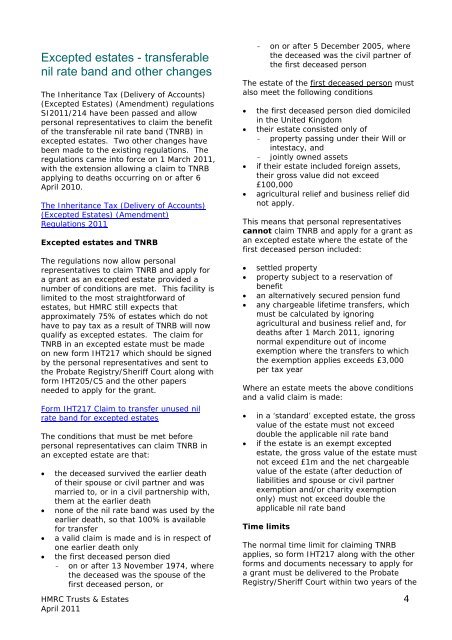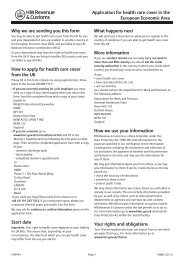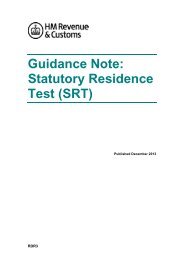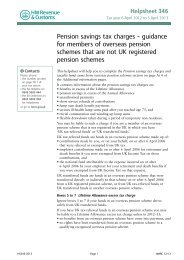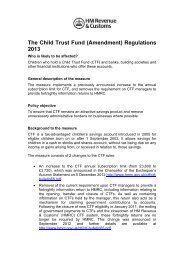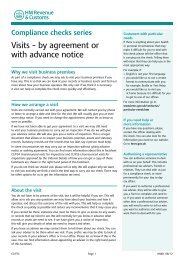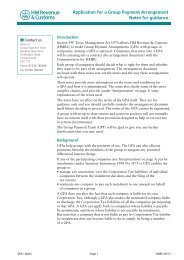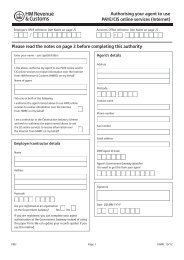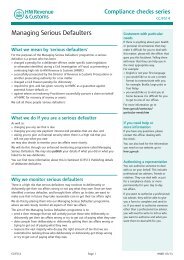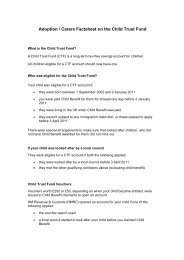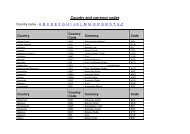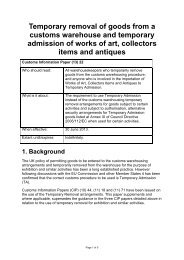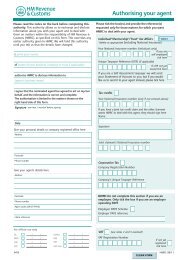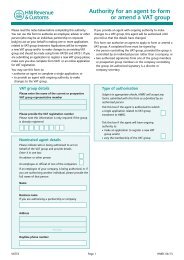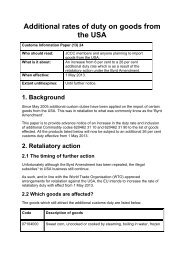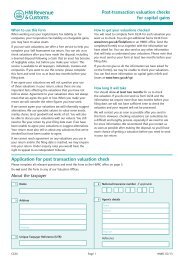HMRC Trusts & Estates newsletter - HM Revenue & Customs
HMRC Trusts & Estates newsletter - HM Revenue & Customs
HMRC Trusts & Estates newsletter - HM Revenue & Customs
You also want an ePaper? Increase the reach of your titles
YUMPU automatically turns print PDFs into web optimized ePapers that Google loves.
Excepted estates - transferable<br />
nil rate band and other changes<br />
The Inheritance Tax (Delivery of Accounts)<br />
(Excepted <strong>Estates</strong>) (Amendment) regulations<br />
SI2011/214 have been passed and allow<br />
personal representatives to claim the benefit<br />
of the transferable nil rate band (TNRB) in<br />
excepted estates. Two other changes have<br />
been made to the existing regulations. The<br />
regulations came into force on 1 March 2011,<br />
with the extension allowing a claim to TNRB<br />
applying to deaths occurring on or after 6<br />
April 2010.<br />
The Inheritance Tax (Delivery of Accounts)<br />
(Excepted <strong>Estates</strong>) (Amendment)<br />
Regulations 2011<br />
Excepted estates and TNRB<br />
The regulations now allow personal<br />
representatives to claim TNRB and apply for<br />
a grant as an excepted estate provided a<br />
number of conditions are met. This facility is<br />
limited to the most straightforward of<br />
estates, but <strong><strong>HM</strong>RC</strong> still expects that<br />
approximately 75% of estates which do not<br />
have to pay tax as a result of TNRB will now<br />
qualify as excepted estates. The claim for<br />
TNRB in an excepted estate must be made<br />
on new form IHT217 which should be signed<br />
by the personal representatives and sent to<br />
the Probate Registry/Sheriff Court along with<br />
form IHT205/C5 and the other papers<br />
needed to apply for the grant.<br />
Form IHT217 Claim to transfer unused nil<br />
rate band for excepted estates<br />
The conditions that must be met before<br />
personal representatives can claim TNRB in<br />
an excepted estate are that:<br />
� the deceased survived the earlier death<br />
of their spouse or civil partner and was<br />
married to, or in a civil partnership with,<br />
them at the earlier death<br />
� none of the nil rate band was used by the<br />
earlier death, so that 100% is available<br />
for transfer<br />
� a valid claim is made and is in respect of<br />
one earlier death only<br />
� the first deceased person died<br />
- on or after 13 November 1974, where<br />
the deceased was the spouse of the<br />
first deceased person, or<br />
- on or after 5 December 2005, where<br />
the deceased was the civil partner of<br />
the first deceased person<br />
The estate of the first deceased person must<br />
also meet the following conditions<br />
� the first deceased person died domiciled<br />
in the United Kingdom<br />
� their estate consisted only of<br />
- property passing under their Will or<br />
intestacy, and<br />
- jointly owned assets<br />
� if their estate included foreign assets,<br />
their gross value did not exceed<br />
£100,000<br />
� agricultural relief and business relief did<br />
not apply.<br />
This means that personal representatives<br />
cannot claim TNRB and apply for a grant as<br />
an excepted estate where the estate of the<br />
first deceased person included:<br />
� settled property<br />
� property subject to a reservation of<br />
benefit<br />
� an alternatively secured pension fund<br />
� any chargeable lifetime transfers, which<br />
must be calculated by ignoring<br />
agricultural and business relief and, for<br />
deaths after 1 March 2011, ignoring<br />
normal expenditure out of income<br />
exemption where the transfers to which<br />
the exemption applies exceeds £3,000<br />
per tax year<br />
Where an estate meets the above conditions<br />
and a valid claim is made:<br />
� in a ‘standard’ excepted estate, the gross<br />
value of the estate must not exceed<br />
double the applicable nil rate band<br />
� if the estate is an exempt excepted<br />
estate, the gross value of the estate must<br />
not exceed £1m and the net chargeable<br />
value of the estate (after deduction of<br />
liabilities and spouse or civil partner<br />
exemption and/or charity exemption<br />
only) must not exceed double the<br />
applicable nil rate band<br />
Time limits<br />
The normal time limit for claiming TNRB<br />
applies, so form IHT217 along with the other<br />
forms and documents necessary to apply for<br />
a grant must be delivered to the Probate<br />
Registry/Sheriff Court within two years of the<br />
<strong><strong>HM</strong>RC</strong> <strong>Trusts</strong> & <strong>Estates</strong> 4<br />
April 2011


